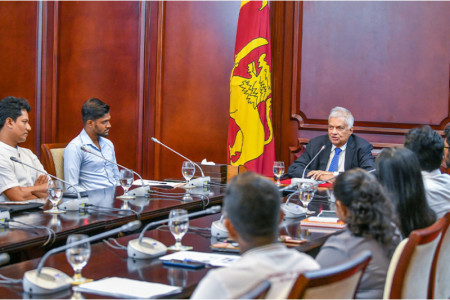aiming to proliferate AI across all sectors within a span of five years. The President underscored the pivotal role assigned to the university system in this initiative.
These remarks were made during a discussion held at the Presidential Secretariat yesterday afternoon (30), engaging university scholars on the integration of AI technology in Sri Lanka.
President Ranil Wickremesinghe further stressed the urgency of transitioning from an import-dependent economy to an export-oriented one to safeguard the nation’s economic stability.
Highlighting the critical timeline between 2027 and 2040 for addressing foreign debt obligations, President Ranil Wickremesinghe emphasized the pivotal requirement of achieving a substantial transformation in the Sri Lankan economy by 2035 to meet this obligation. In pursuit of these economic goals, he reiterated his commitment to fostering the adoption of modern technologies such as AI within the country.
During the meeting, a proposal developed by several university professors and scholars on the application of AI technology was presented to the President. The scholars noted that several universities have already undertaken numerous AI projects and briefed the President on the operations and objectives of these initiatives.
President Wickremesinghe further stated,
“Sri Lanka needs to leapfrog in terms of technology. We are significantly behind, and we haven’t utilized our knowledge for economic benefit. Therefore, the new frontier is AI, and we cannot afford to lag in this field. Advancing in AI will pave the way for progress in other technologies. To my understanding, AI will encompass all technologies.
Our future actions will be judged by how we harness AI. Sri Lanka cannot afford to be left behind in this regard. We must not repeat the mistakes we made with IT. In the past, despite initiatives like Syntech, we failed to apply these technologies nationwide, resulting in our lag behind other countries.
Reflecting on my experience in starting computer education in 1984, although we introduced Sinclair computers, our efforts were not widespread and took a long time to materialize. However, that is in the past. Now, we must catch up. AI should lead the way.
Currently, I am working within the Ministry of Technology to establish a Digital Transformation Agency. This agency will not only focus on IT but will also facilitate social and economic transformation through digitalization, aiming for a digital economy.
Cooperation between the Economic Commission, Ministry of Finance, and subsequent application to the social sphere will be vital. Additionally, within this agency, there will be a separate autonomous body called the National AI Centre, focusing on AI application in various fields and as an economic activity. The corresponding act is being drafted.
Furthermore, we are establishing a Technology Development Council to promote commercial research, distinct from the Science and Technology Fund, which focuses on pure research. We need to ensure successful ventures by assessing the returns on our investments. While some funds have been allocated, most remain unused this year. However, we will carry these funds forward to the next year for projects.
Regarding AI initiatives, progress may commence in the second half of the year, with collaborations such as with Syntec. Efforts are underway to involve the private sector. We are at a primary stage, but efforts are being made to engage with the Ministry directly, involving the Secretary and the State Minister.
I have proposed starting AI clubs in schools and integrating AI into university curricula, rather than establishing separate AI departments. Additionally, I am advocating for the establishment of engineering departments in universities lacking them. Four new universities, primarily focused on technology, are being considered. These include the Galaha campus of the Chennai Institute of Technology, Kurunegala University, Sithavaka University, and potentially another university in partnership with a foreign institution.
Furthermore, I am considering allocating funds for separate research on AI and Buddhism, exploring the intersection between natural and artificially created intelligence. This initiative welcomes participation from all interested parties.
In the next five years, our goal is to excel in AI, transitioning from an import-dependent to an export-dependent economy. Discussions with the IMF are ongoing, and we have until 2040 to pay off existing debts. However, given our import dependence, we may accumulate more debt, necessitating a significant economic transformation by 2035, in which AI will play a crucial role.
Promoting technology is imperative for Sri Lanka’s economic future. AI, being global rather than territorial, offers an opportunity for us to excel and make a mark, especially in comparison to other South Asian countries. While India may have the largest number of people involved in AI, we aim to have a higher percentage of our population engaged in technology overall. Agriculture modernization, particularly through Agriculture 4, will also benefit from these technological advancements, especially for small-scale farmers.”
Dr. Prasad Samarasinghe, Chairman of National Television and creator of the first television program utilizing AI technology, also spoke at the event. The gathering included university lecturers and scholars, as well as Mr. Randula Abeyweera, the Presidential Director on Youth Affairs and Sustainable Development, along with other participants.
n.lk


